EMR Report: Developing Individual, Teams, and Organisations Skills
VerifiedAdded on 2024/07/01
|23
|4575
|468
Report
AI Summary
This report provides a detailed analysis of the skills, knowledge, and behaviors required by HR professionals, focusing on the case of European Metal Recycling (EMR). It includes a personal skills audit for an HR officer, Jane Cambridge, and a corresponding professional development plan. The report differentiates between organizational and individual learning, as well as training and development, highlighting the significance of continuous learning and professional development for sustainable business growth. The Kolb learning cycle theory is also discussed in the context of enhancing employee learning experiences and driving business development within EMR. This document is available on Desklib, a platform offering various study tools and solved assignments for students.
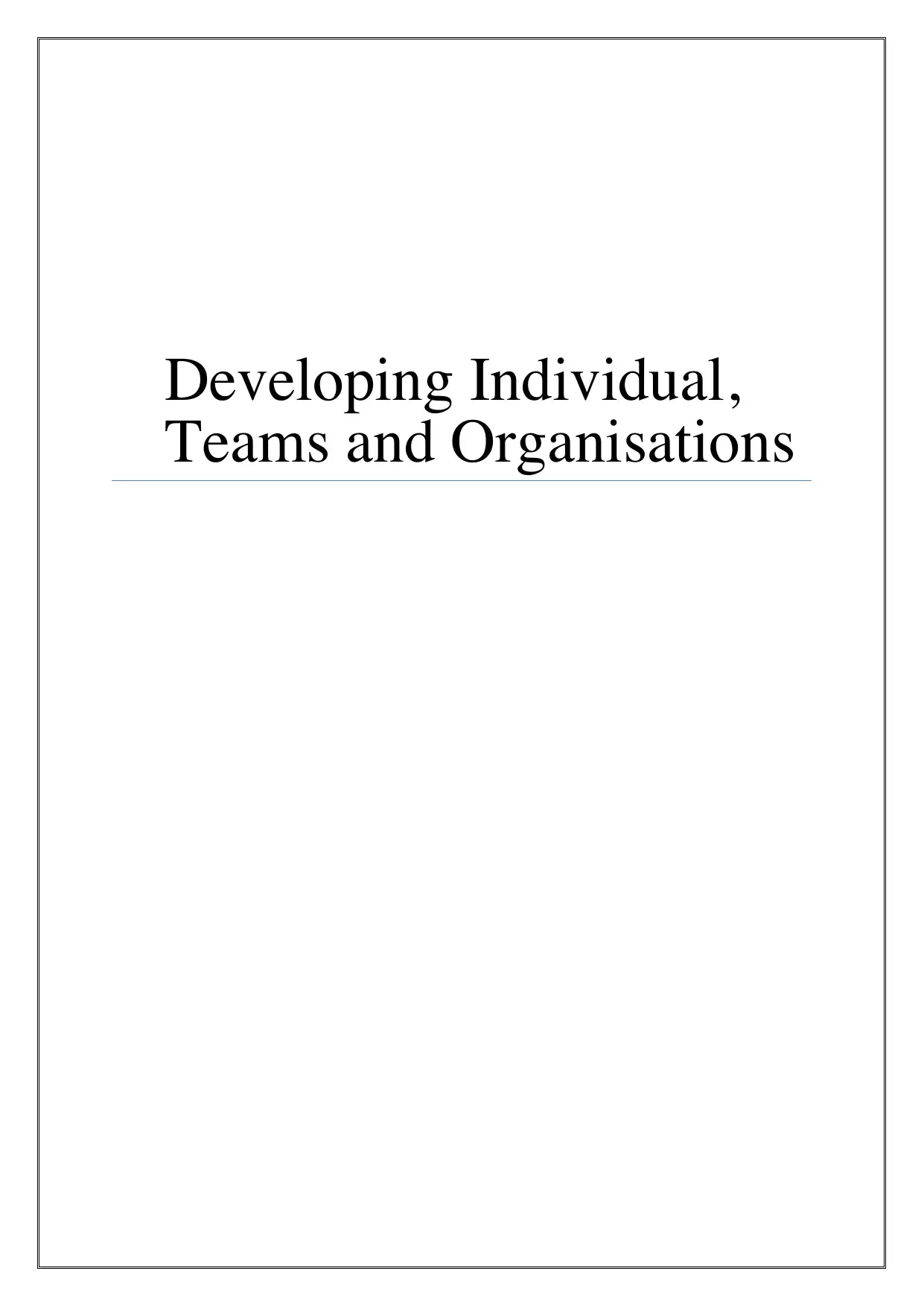
Paraphrase This Document
Need a fresh take? Get an instant paraphrase of this document with our AI Paraphraser
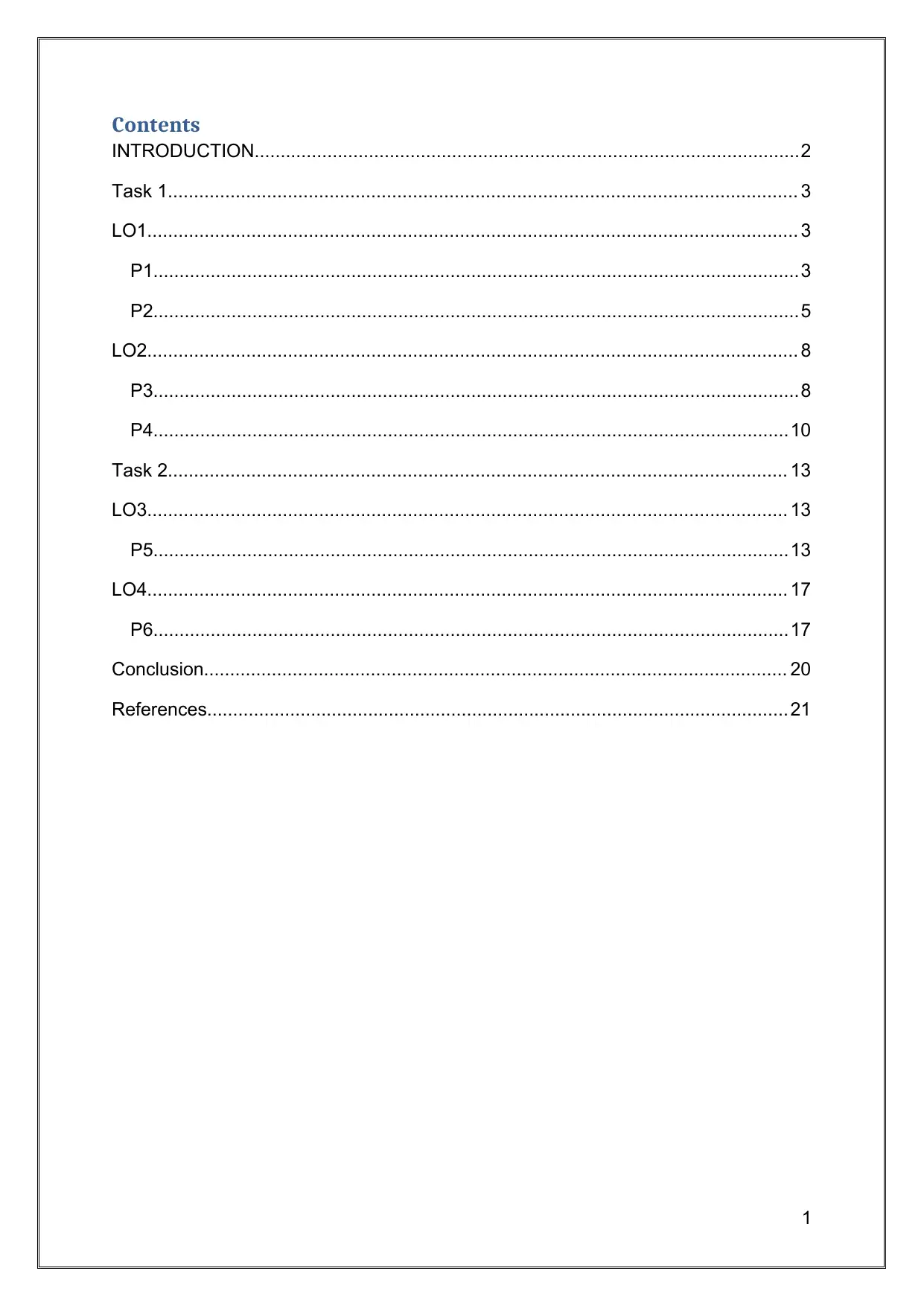
Contents
INTRODUCTION.........................................................................................................2
Task 1......................................................................................................................... 3
LO1............................................................................................................................. 3
P1............................................................................................................................3
P2............................................................................................................................5
LO2............................................................................................................................. 8
P3............................................................................................................................8
P4..........................................................................................................................10
Task 2....................................................................................................................... 13
LO3........................................................................................................................... 13
P5..........................................................................................................................13
LO4........................................................................................................................... 17
P6..........................................................................................................................17
Conclusion................................................................................................................ 20
References................................................................................................................ 21
1
INTRODUCTION.........................................................................................................2
Task 1......................................................................................................................... 3
LO1............................................................................................................................. 3
P1............................................................................................................................3
P2............................................................................................................................5
LO2............................................................................................................................. 8
P3............................................................................................................................8
P4..........................................................................................................................10
Task 2....................................................................................................................... 13
LO3........................................................................................................................... 13
P5..........................................................................................................................13
LO4........................................................................................................................... 17
P6..........................................................................................................................17
Conclusion................................................................................................................ 20
References................................................................................................................ 21
1
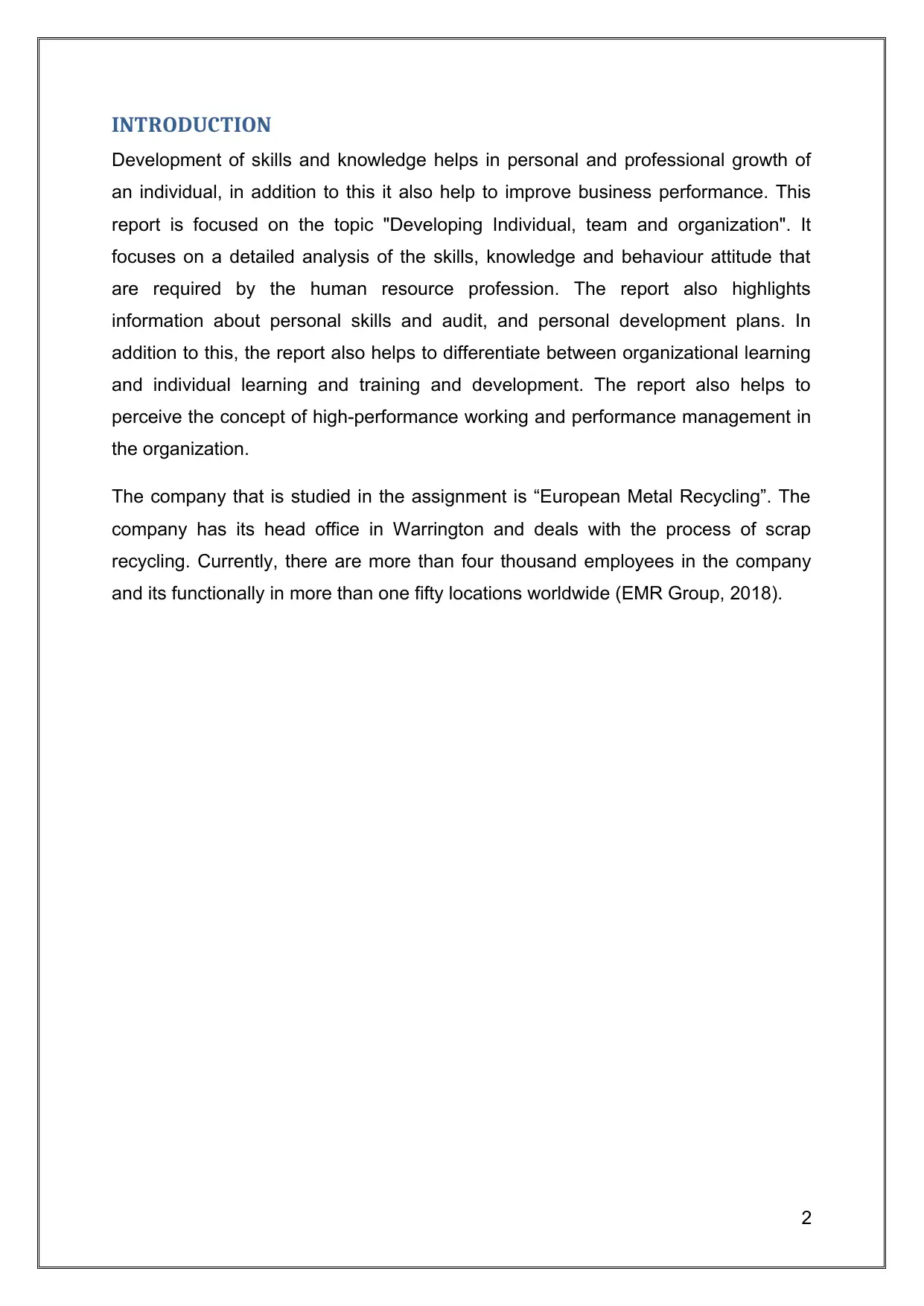
INTRODUCTION
Development of skills and knowledge helps in personal and professional growth of
an individual, in addition to this it also help to improve business performance. This
report is focused on the topic "Developing Individual, team and organization". It
focuses on a detailed analysis of the skills, knowledge and behaviour attitude that
are required by the human resource profession. The report also highlights
information about personal skills and audit, and personal development plans. In
addition to this, the report also helps to differentiate between organizational learning
and individual learning and training and development. The report also helps to
perceive the concept of high-performance working and performance management in
the organization.
The company that is studied in the assignment is “European Metal Recycling”. The
company has its head office in Warrington and deals with the process of scrap
recycling. Currently, there are more than four thousand employees in the company
and its functionally in more than one fifty locations worldwide (EMR Group, 2018).
2
Development of skills and knowledge helps in personal and professional growth of
an individual, in addition to this it also help to improve business performance. This
report is focused on the topic "Developing Individual, team and organization". It
focuses on a detailed analysis of the skills, knowledge and behaviour attitude that
are required by the human resource profession. The report also highlights
information about personal skills and audit, and personal development plans. In
addition to this, the report also helps to differentiate between organizational learning
and individual learning and training and development. The report also helps to
perceive the concept of high-performance working and performance management in
the organization.
The company that is studied in the assignment is “European Metal Recycling”. The
company has its head office in Warrington and deals with the process of scrap
recycling. Currently, there are more than four thousand employees in the company
and its functionally in more than one fifty locations worldwide (EMR Group, 2018).
2
⊘ This is a preview!⊘
Do you want full access?
Subscribe today to unlock all pages.

Trusted by 1+ million students worldwide
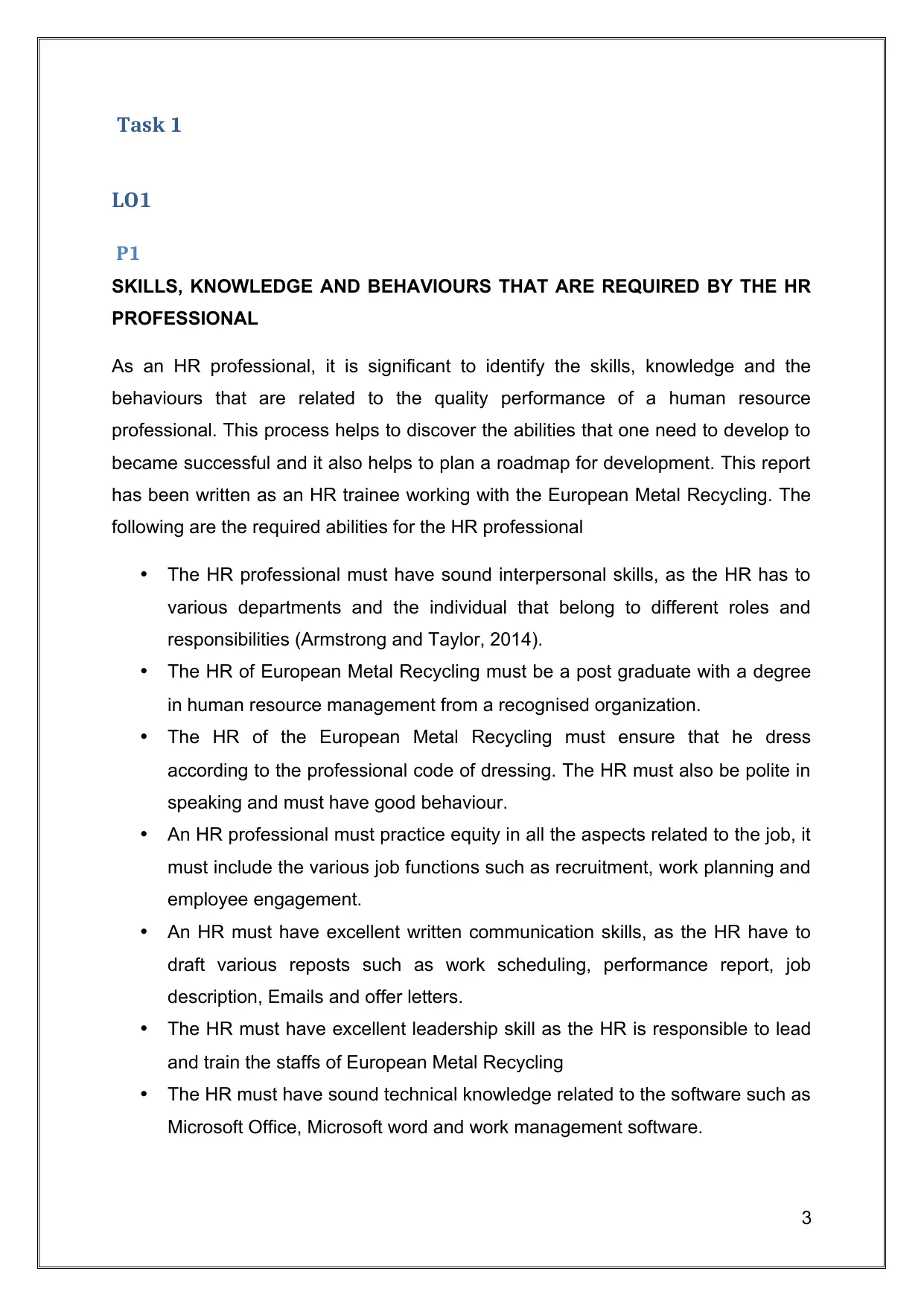
Task 1
LO1
P1
SKILLS, KNOWLEDGE AND BEHAVIOURS THAT ARE REQUIRED BY THE HR
PROFESSIONAL
As an HR professional, it is significant to identify the skills, knowledge and the
behaviours that are related to the quality performance of a human resource
professional. This process helps to discover the abilities that one need to develop to
became successful and it also helps to plan a roadmap for development. This report
has been written as an HR trainee working with the European Metal Recycling. The
following are the required abilities for the HR professional
The HR professional must have sound interpersonal skills, as the HR has to
various departments and the individual that belong to different roles and
responsibilities (Armstrong and Taylor, 2014).
The HR of European Metal Recycling must be a post graduate with a degree
in human resource management from a recognised organization.
The HR of the European Metal Recycling must ensure that he dress
according to the professional code of dressing. The HR must also be polite in
speaking and must have good behaviour.
An HR professional must practice equity in all the aspects related to the job, it
must include the various job functions such as recruitment, work planning and
employee engagement.
An HR must have excellent written communication skills, as the HR have to
draft various reposts such as work scheduling, performance report, job
description, Emails and offer letters.
The HR must have excellent leadership skill as the HR is responsible to lead
and train the staffs of European Metal Recycling
The HR must have sound technical knowledge related to the software such as
Microsoft Office, Microsoft word and work management software.
3
LO1
P1
SKILLS, KNOWLEDGE AND BEHAVIOURS THAT ARE REQUIRED BY THE HR
PROFESSIONAL
As an HR professional, it is significant to identify the skills, knowledge and the
behaviours that are related to the quality performance of a human resource
professional. This process helps to discover the abilities that one need to develop to
became successful and it also helps to plan a roadmap for development. This report
has been written as an HR trainee working with the European Metal Recycling. The
following are the required abilities for the HR professional
The HR professional must have sound interpersonal skills, as the HR has to
various departments and the individual that belong to different roles and
responsibilities (Armstrong and Taylor, 2014).
The HR of European Metal Recycling must be a post graduate with a degree
in human resource management from a recognised organization.
The HR of the European Metal Recycling must ensure that he dress
according to the professional code of dressing. The HR must also be polite in
speaking and must have good behaviour.
An HR professional must practice equity in all the aspects related to the job, it
must include the various job functions such as recruitment, work planning and
employee engagement.
An HR must have excellent written communication skills, as the HR have to
draft various reposts such as work scheduling, performance report, job
description, Emails and offer letters.
The HR must have excellent leadership skill as the HR is responsible to lead
and train the staffs of European Metal Recycling
The HR must have sound technical knowledge related to the software such as
Microsoft Office, Microsoft word and work management software.
3
Paraphrase This Document
Need a fresh take? Get an instant paraphrase of this document with our AI Paraphraser
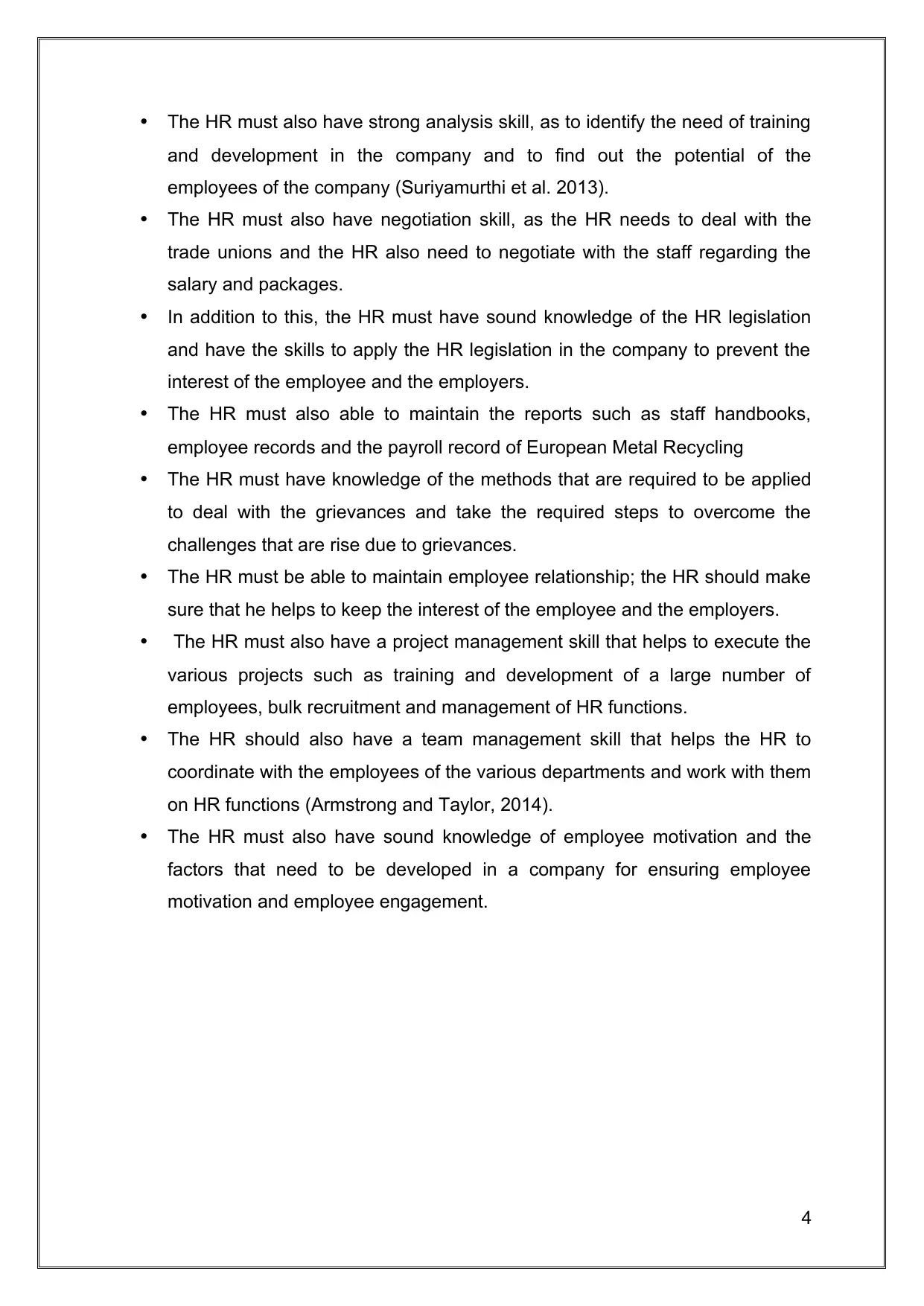
The HR must also have strong analysis skill, as to identify the need of training
and development in the company and to find out the potential of the
employees of the company (Suriyamurthi et al. 2013).
The HR must also have negotiation skill, as the HR needs to deal with the
trade unions and the HR also need to negotiate with the staff regarding the
salary and packages.
In addition to this, the HR must have sound knowledge of the HR legislation
and have the skills to apply the HR legislation in the company to prevent the
interest of the employee and the employers.
The HR must also able to maintain the reports such as staff handbooks,
employee records and the payroll record of European Metal Recycling
The HR must have knowledge of the methods that are required to be applied
to deal with the grievances and take the required steps to overcome the
challenges that are rise due to grievances.
The HR must be able to maintain employee relationship; the HR should make
sure that he helps to keep the interest of the employee and the employers.
The HR must also have a project management skill that helps to execute the
various projects such as training and development of a large number of
employees, bulk recruitment and management of HR functions.
The HR should also have a team management skill that helps the HR to
coordinate with the employees of the various departments and work with them
on HR functions (Armstrong and Taylor, 2014).
The HR must also have sound knowledge of employee motivation and the
factors that need to be developed in a company for ensuring employee
motivation and employee engagement.
4
and development in the company and to find out the potential of the
employees of the company (Suriyamurthi et al. 2013).
The HR must also have negotiation skill, as the HR needs to deal with the
trade unions and the HR also need to negotiate with the staff regarding the
salary and packages.
In addition to this, the HR must have sound knowledge of the HR legislation
and have the skills to apply the HR legislation in the company to prevent the
interest of the employee and the employers.
The HR must also able to maintain the reports such as staff handbooks,
employee records and the payroll record of European Metal Recycling
The HR must have knowledge of the methods that are required to be applied
to deal with the grievances and take the required steps to overcome the
challenges that are rise due to grievances.
The HR must be able to maintain employee relationship; the HR should make
sure that he helps to keep the interest of the employee and the employers.
The HR must also have a project management skill that helps to execute the
various projects such as training and development of a large number of
employees, bulk recruitment and management of HR functions.
The HR should also have a team management skill that helps the HR to
coordinate with the employees of the various departments and work with them
on HR functions (Armstrong and Taylor, 2014).
The HR must also have sound knowledge of employee motivation and the
factors that need to be developed in a company for ensuring employee
motivation and employee engagement.
4
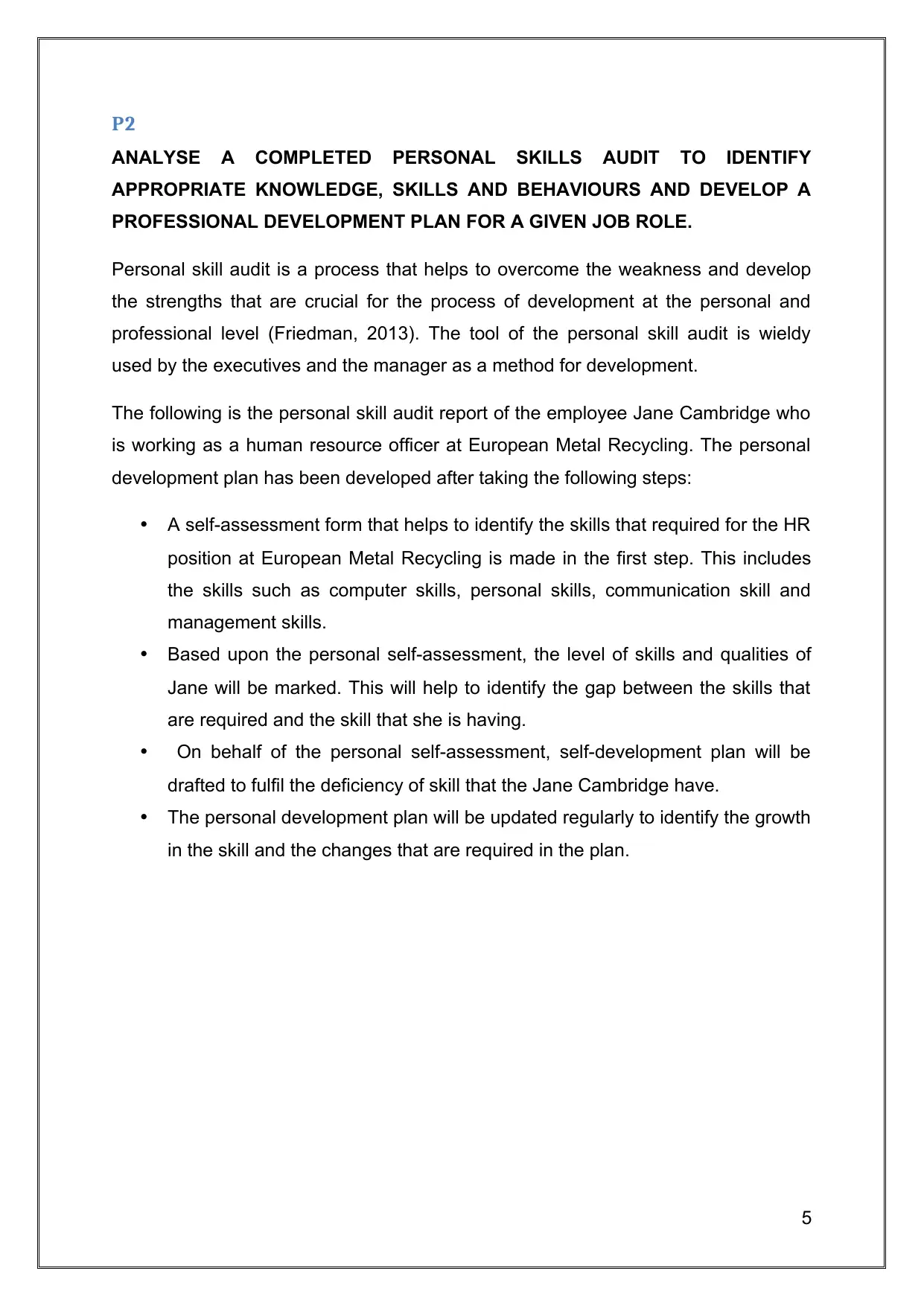
P2
ANALYSE A COMPLETED PERSONAL SKILLS AUDIT TO IDENTIFY
APPROPRIATE KNOWLEDGE, SKILLS AND BEHAVIOURS AND DEVELOP A
PROFESSIONAL DEVELOPMENT PLAN FOR A GIVEN JOB ROLE.
Personal skill audit is a process that helps to overcome the weakness and develop
the strengths that are crucial for the process of development at the personal and
professional level (Friedman, 2013). The tool of the personal skill audit is wieldy
used by the executives and the manager as a method for development.
The following is the personal skill audit report of the employee Jane Cambridge who
is working as a human resource officer at European Metal Recycling. The personal
development plan has been developed after taking the following steps:
A self-assessment form that helps to identify the skills that required for the HR
position at European Metal Recycling is made in the first step. This includes
the skills such as computer skills, personal skills, communication skill and
management skills.
Based upon the personal self-assessment, the level of skills and qualities of
Jane will be marked. This will help to identify the gap between the skills that
are required and the skill that she is having.
On behalf of the personal self-assessment, self-development plan will be
drafted to fulfil the deficiency of skill that the Jane Cambridge have.
The personal development plan will be updated regularly to identify the growth
in the skill and the changes that are required in the plan.
5
ANALYSE A COMPLETED PERSONAL SKILLS AUDIT TO IDENTIFY
APPROPRIATE KNOWLEDGE, SKILLS AND BEHAVIOURS AND DEVELOP A
PROFESSIONAL DEVELOPMENT PLAN FOR A GIVEN JOB ROLE.
Personal skill audit is a process that helps to overcome the weakness and develop
the strengths that are crucial for the process of development at the personal and
professional level (Friedman, 2013). The tool of the personal skill audit is wieldy
used by the executives and the manager as a method for development.
The following is the personal skill audit report of the employee Jane Cambridge who
is working as a human resource officer at European Metal Recycling. The personal
development plan has been developed after taking the following steps:
A self-assessment form that helps to identify the skills that required for the HR
position at European Metal Recycling is made in the first step. This includes
the skills such as computer skills, personal skills, communication skill and
management skills.
Based upon the personal self-assessment, the level of skills and qualities of
Jane will be marked. This will help to identify the gap between the skills that
are required and the skill that she is having.
On behalf of the personal self-assessment, self-development plan will be
drafted to fulfil the deficiency of skill that the Jane Cambridge have.
The personal development plan will be updated regularly to identify the growth
in the skill and the changes that are required in the plan.
5
⊘ This is a preview!⊘
Do you want full access?
Subscribe today to unlock all pages.

Trusted by 1+ million students worldwide
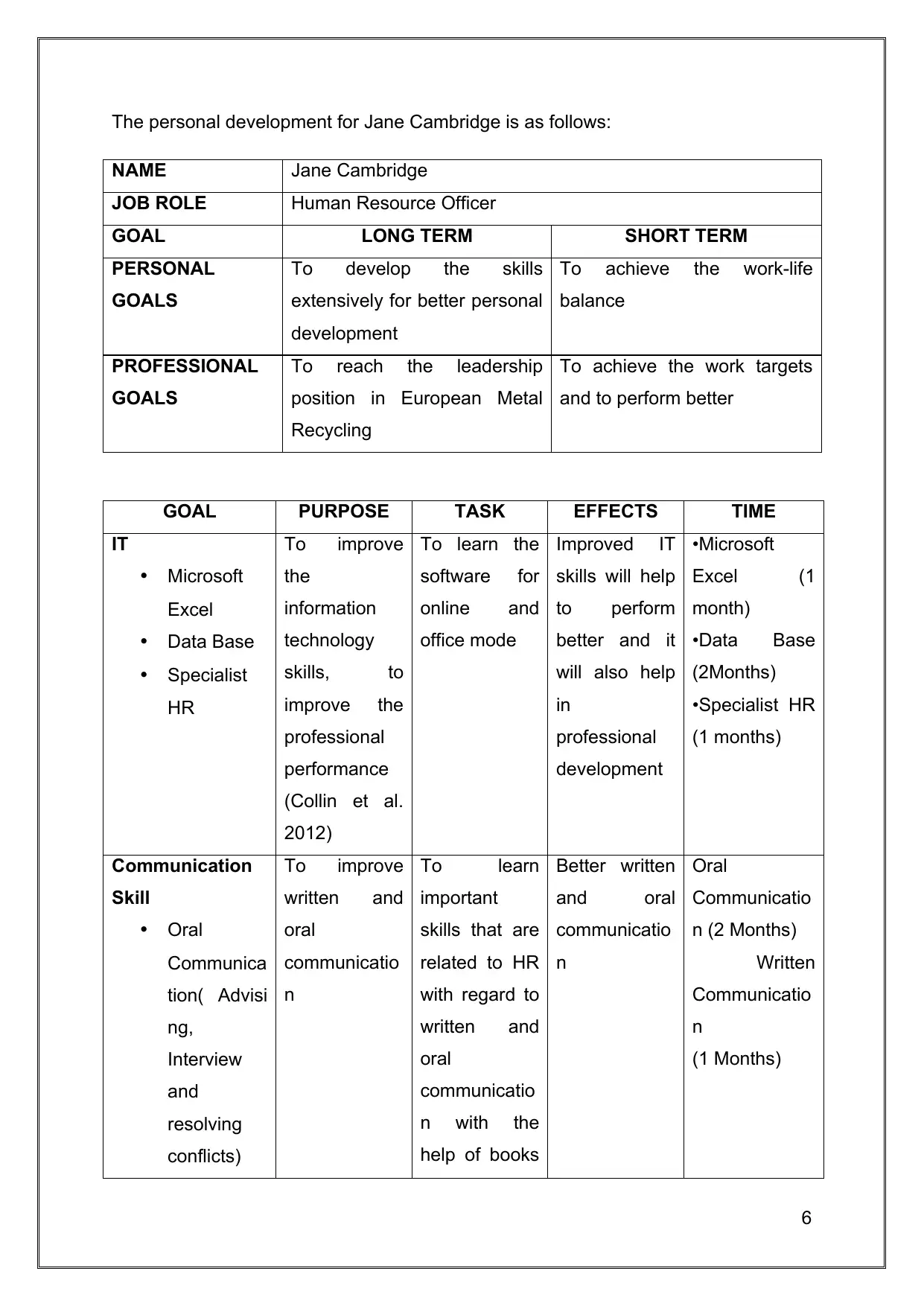
The personal development for Jane Cambridge is as follows:
NAME Jane Cambridge
JOB ROLE Human Resource Officer
GOAL LONG TERM SHORT TERM
PERSONAL
GOALS
To develop the skills
extensively for better personal
development
To achieve the work-life
balance
PROFESSIONAL
GOALS
To reach the leadership
position in European Metal
Recycling
To achieve the work targets
and to perform better
GOAL PURPOSE TASK EFFECTS TIME
IT
Microsoft
Excel
Data Base
Specialist
HR
To improve
the
information
technology
skills, to
improve the
professional
performance
(Collin et al.
2012)
To learn the
software for
online and
office mode
Improved IT
skills will help
to perform
better and it
will also help
in
professional
development
•Microsoft
Excel (1
month)
•Data Base
(2Months)
•Specialist HR
(1 months)
Communication
Skill
Oral
Communica
tion( Advisi
ng,
Interview
and
resolving
conflicts)
To improve
written and
oral
communicatio
n
To learn
important
skills that are
related to HR
with regard to
written and
oral
communicatio
n with the
help of books
Better written
and oral
communicatio
n
Oral
Communicatio
n (2 Months)
Written
Communicatio
n
(1 Months)
6
NAME Jane Cambridge
JOB ROLE Human Resource Officer
GOAL LONG TERM SHORT TERM
PERSONAL
GOALS
To develop the skills
extensively for better personal
development
To achieve the work-life
balance
PROFESSIONAL
GOALS
To reach the leadership
position in European Metal
Recycling
To achieve the work targets
and to perform better
GOAL PURPOSE TASK EFFECTS TIME
IT
Microsoft
Excel
Data Base
Specialist
HR
To improve
the
information
technology
skills, to
improve the
professional
performance
(Collin et al.
2012)
To learn the
software for
online and
office mode
Improved IT
skills will help
to perform
better and it
will also help
in
professional
development
•Microsoft
Excel (1
month)
•Data Base
(2Months)
•Specialist HR
(1 months)
Communication
Skill
Oral
Communica
tion( Advisi
ng,
Interview
and
resolving
conflicts)
To improve
written and
oral
communicatio
n
To learn
important
skills that are
related to HR
with regard to
written and
oral
communicatio
n with the
help of books
Better written
and oral
communicatio
n
Oral
Communicatio
n (2 Months)
Written
Communicatio
n
(1 Months)
6
Paraphrase This Document
Need a fresh take? Get an instant paraphrase of this document with our AI Paraphraser
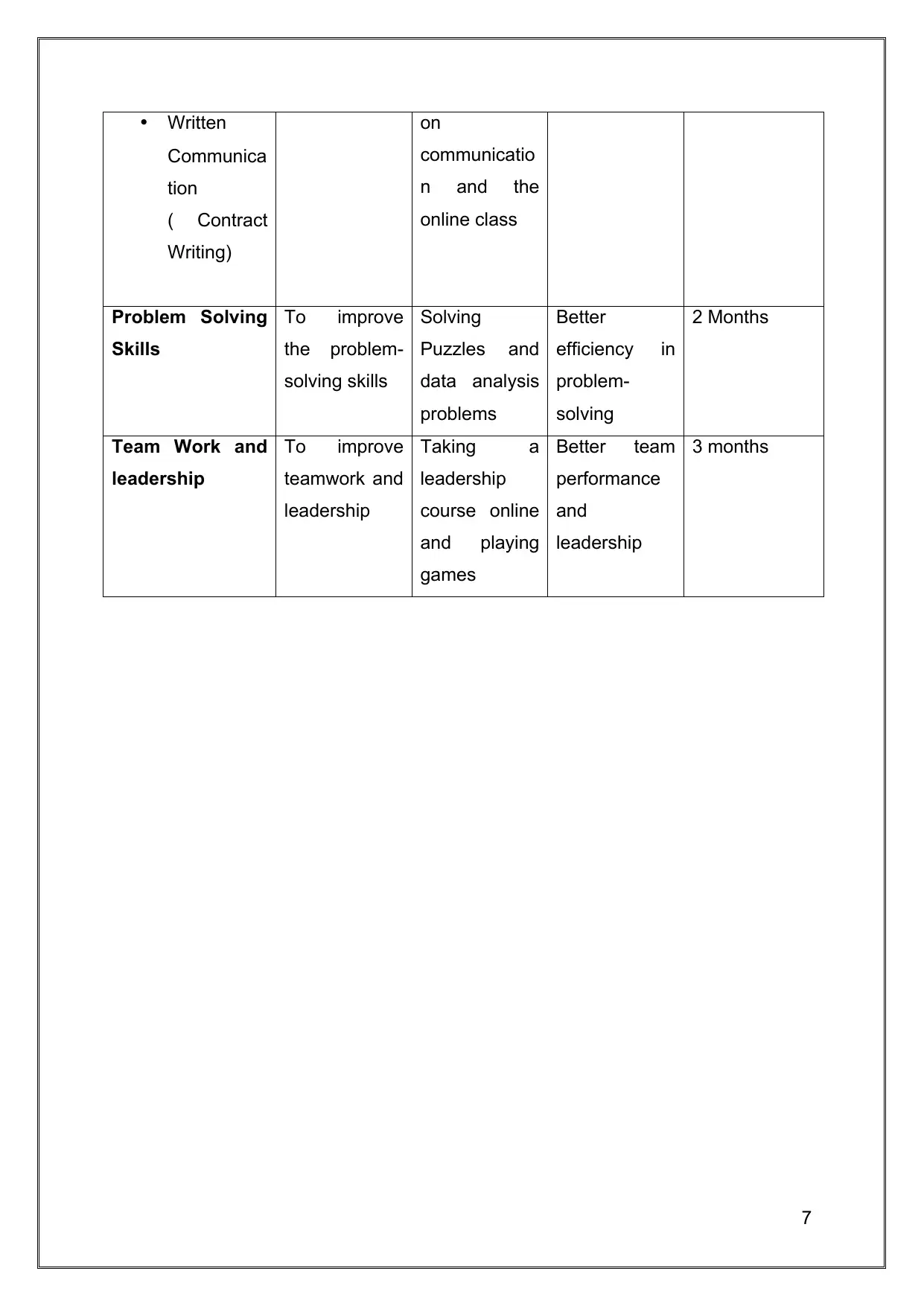
Written
Communica
tion
( Contract
Writing)
on
communicatio
n and the
online class
Problem Solving
Skills
To improve
the problem-
solving skills
Solving
Puzzles and
data analysis
problems
Better
efficiency in
problem-
solving
2 Months
Team Work and
leadership
To improve
teamwork and
leadership
Taking a
leadership
course online
and playing
games
Better team
performance
and
leadership
3 months
7
Communica
tion
( Contract
Writing)
on
communicatio
n and the
online class
Problem Solving
Skills
To improve
the problem-
solving skills
Solving
Puzzles and
data analysis
problems
Better
efficiency in
problem-
solving
2 Months
Team Work and
leadership
To improve
teamwork and
leadership
Taking a
leadership
course online
and playing
games
Better team
performance
and
leadership
3 months
7
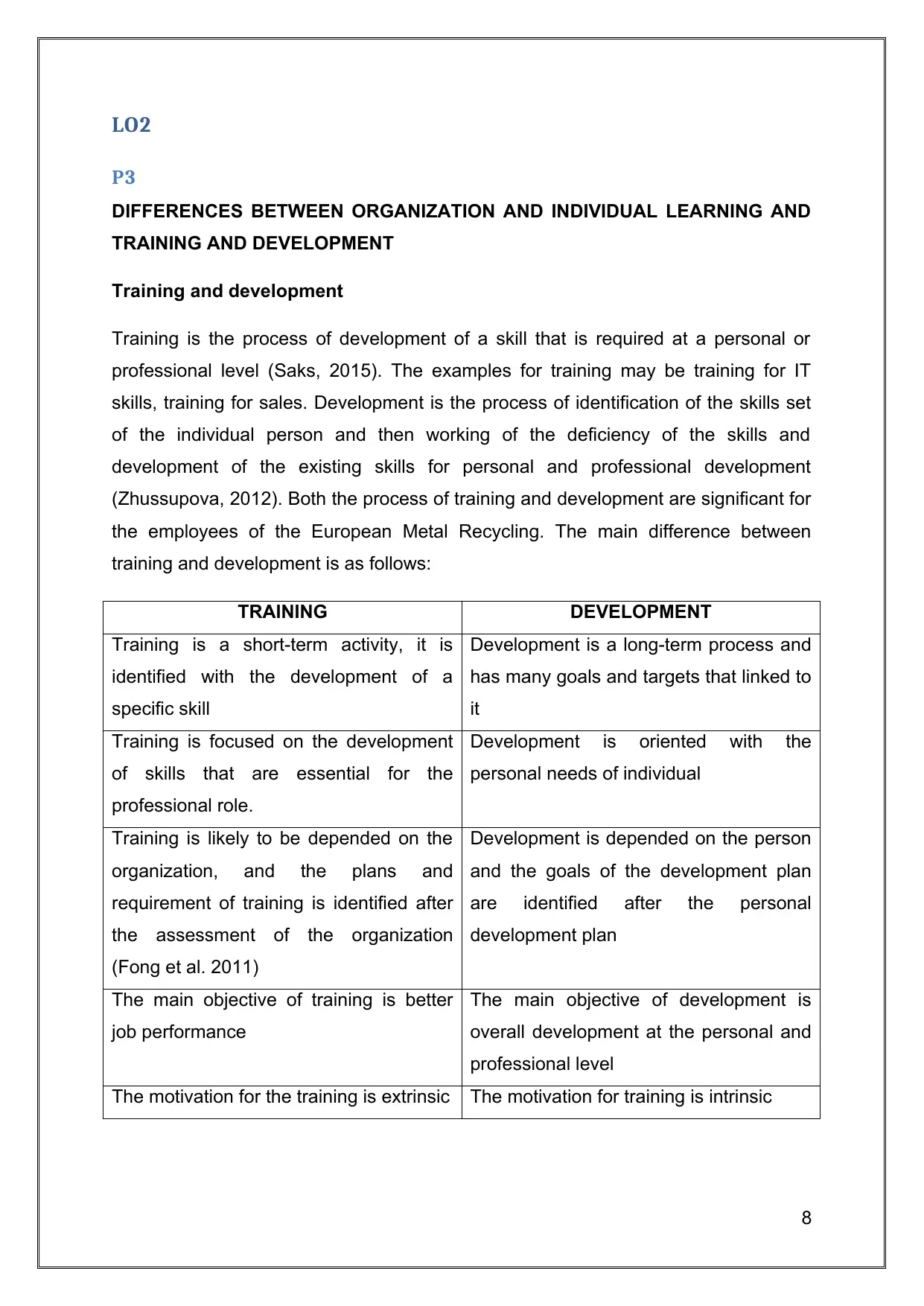
LO2
P3
DIFFERENCES BETWEEN ORGANIZATION AND INDIVIDUAL LEARNING AND
TRAINING AND DEVELOPMENT
Training and development
Training is the process of development of a skill that is required at a personal or
professional level (Saks, 2015). The examples for training may be training for IT
skills, training for sales. Development is the process of identification of the skills set
of the individual person and then working of the deficiency of the skills and
development of the existing skills for personal and professional development
(Zhussupova, 2012). Both the process of training and development are significant for
the employees of the European Metal Recycling. The main difference between
training and development is as follows:
TRAINING DEVELOPMENT
Training is a short-term activity, it is
identified with the development of a
specific skill
Development is a long-term process and
has many goals and targets that linked to
it
Training is focused on the development
of skills that are essential for the
professional role.
Development is oriented with the
personal needs of individual
Training is likely to be depended on the
organization, and the plans and
requirement of training is identified after
the assessment of the organization
(Fong et al. 2011)
Development is depended on the person
and the goals of the development plan
are identified after the personal
development plan
The main objective of training is better
job performance
The main objective of development is
overall development at the personal and
professional level
The motivation for the training is extrinsic The motivation for training is intrinsic
8
P3
DIFFERENCES BETWEEN ORGANIZATION AND INDIVIDUAL LEARNING AND
TRAINING AND DEVELOPMENT
Training and development
Training is the process of development of a skill that is required at a personal or
professional level (Saks, 2015). The examples for training may be training for IT
skills, training for sales. Development is the process of identification of the skills set
of the individual person and then working of the deficiency of the skills and
development of the existing skills for personal and professional development
(Zhussupova, 2012). Both the process of training and development are significant for
the employees of the European Metal Recycling. The main difference between
training and development is as follows:
TRAINING DEVELOPMENT
Training is a short-term activity, it is
identified with the development of a
specific skill
Development is a long-term process and
has many goals and targets that linked to
it
Training is focused on the development
of skills that are essential for the
professional role.
Development is oriented with the
personal needs of individual
Training is likely to be depended on the
organization, and the plans and
requirement of training is identified after
the assessment of the organization
(Fong et al. 2011)
Development is depended on the person
and the goals of the development plan
are identified after the personal
development plan
The main objective of training is better
job performance
The main objective of development is
overall development at the personal and
professional level
The motivation for the training is extrinsic The motivation for training is intrinsic
8
⊘ This is a preview!⊘
Do you want full access?
Subscribe today to unlock all pages.

Trusted by 1+ million students worldwide
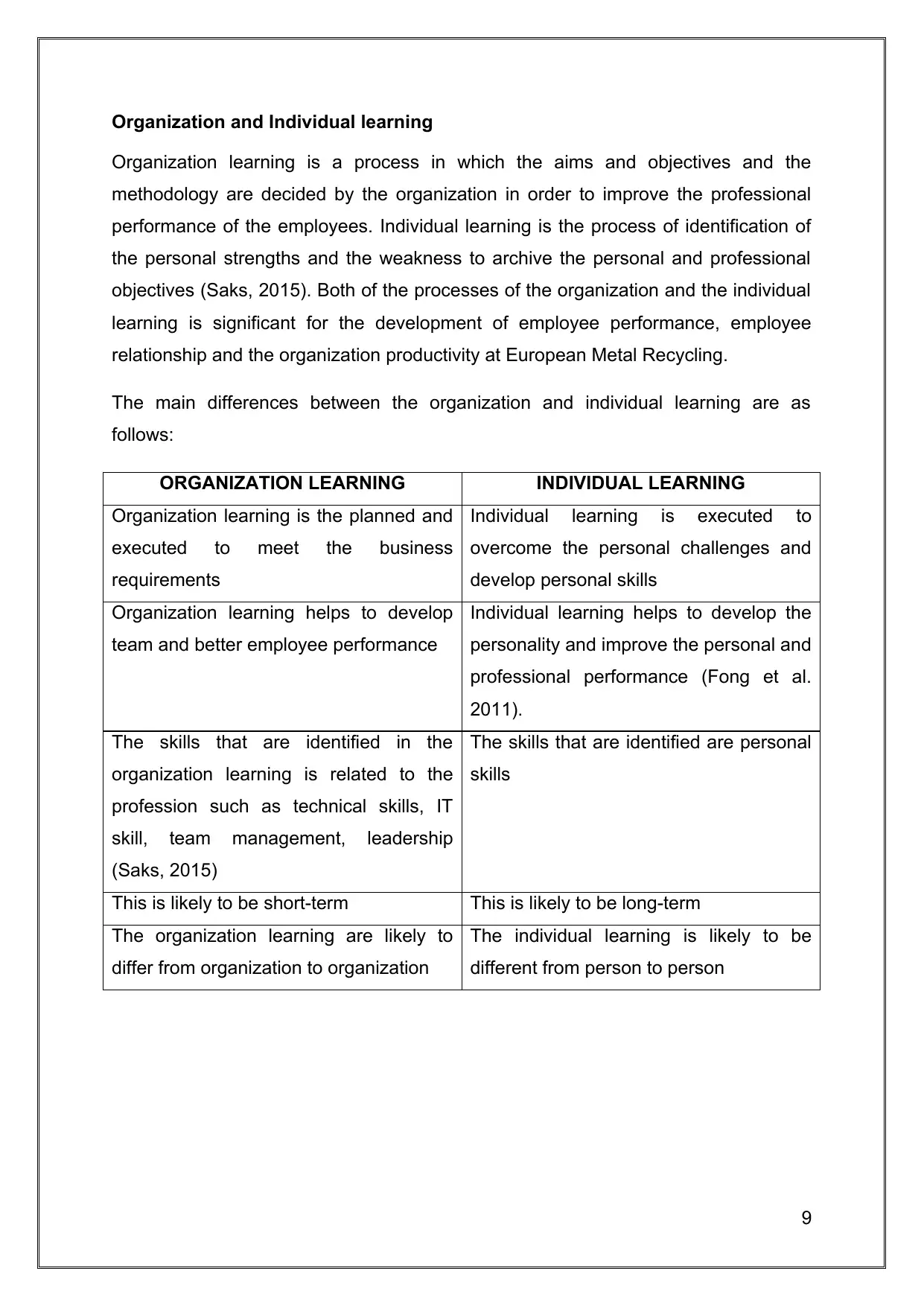
Organization and Individual learning
Organization learning is a process in which the aims and objectives and the
methodology are decided by the organization in order to improve the professional
performance of the employees. Individual learning is the process of identification of
the personal strengths and the weakness to archive the personal and professional
objectives (Saks, 2015). Both of the processes of the organization and the individual
learning is significant for the development of employee performance, employee
relationship and the organization productivity at European Metal Recycling.
The main differences between the organization and individual learning are as
follows:
ORGANIZATION LEARNING INDIVIDUAL LEARNING
Organization learning is the planned and
executed to meet the business
requirements
Individual learning is executed to
overcome the personal challenges and
develop personal skills
Organization learning helps to develop
team and better employee performance
Individual learning helps to develop the
personality and improve the personal and
professional performance (Fong et al.
2011).
The skills that are identified in the
organization learning is related to the
profession such as technical skills, IT
skill, team management, leadership
(Saks, 2015)
The skills that are identified are personal
skills
This is likely to be short-term This is likely to be long-term
The organization learning are likely to
differ from organization to organization
The individual learning is likely to be
different from person to person
9
Organization learning is a process in which the aims and objectives and the
methodology are decided by the organization in order to improve the professional
performance of the employees. Individual learning is the process of identification of
the personal strengths and the weakness to archive the personal and professional
objectives (Saks, 2015). Both of the processes of the organization and the individual
learning is significant for the development of employee performance, employee
relationship and the organization productivity at European Metal Recycling.
The main differences between the organization and individual learning are as
follows:
ORGANIZATION LEARNING INDIVIDUAL LEARNING
Organization learning is the planned and
executed to meet the business
requirements
Individual learning is executed to
overcome the personal challenges and
develop personal skills
Organization learning helps to develop
team and better employee performance
Individual learning helps to develop the
personality and improve the personal and
professional performance (Fong et al.
2011).
The skills that are identified in the
organization learning is related to the
profession such as technical skills, IT
skill, team management, leadership
(Saks, 2015)
The skills that are identified are personal
skills
This is likely to be short-term This is likely to be long-term
The organization learning are likely to
differ from organization to organization
The individual learning is likely to be
different from person to person
9
Paraphrase This Document
Need a fresh take? Get an instant paraphrase of this document with our AI Paraphraser
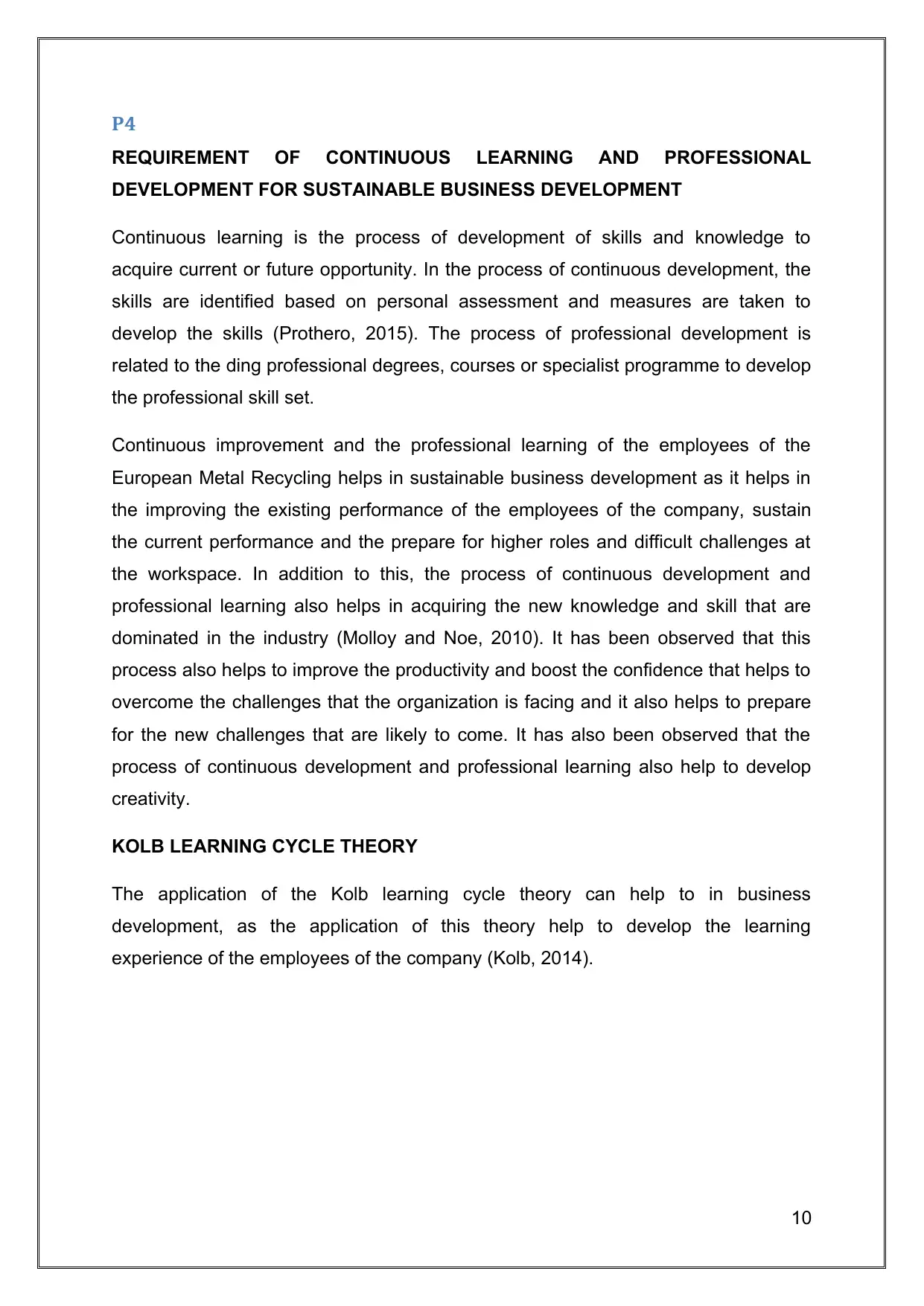
P4
REQUIREMENT OF CONTINUOUS LEARNING AND PROFESSIONAL
DEVELOPMENT FOR SUSTAINABLE BUSINESS DEVELOPMENT
Continuous learning is the process of development of skills and knowledge to
acquire current or future opportunity. In the process of continuous development, the
skills are identified based on personal assessment and measures are taken to
develop the skills (Prothero, 2015). The process of professional development is
related to the ding professional degrees, courses or specialist programme to develop
the professional skill set.
Continuous improvement and the professional learning of the employees of the
European Metal Recycling helps in sustainable business development as it helps in
the improving the existing performance of the employees of the company, sustain
the current performance and the prepare for higher roles and difficult challenges at
the workspace. In addition to this, the process of continuous development and
professional learning also helps in acquiring the new knowledge and skill that are
dominated in the industry (Molloy and Noe, 2010). It has been observed that this
process also helps to improve the productivity and boost the confidence that helps to
overcome the challenges that the organization is facing and it also helps to prepare
for the new challenges that are likely to come. It has also been observed that the
process of continuous development and professional learning also help to develop
creativity.
KOLB LEARNING CYCLE THEORY
The application of the Kolb learning cycle theory can help to in business
development, as the application of this theory help to develop the learning
experience of the employees of the company (Kolb, 2014).
10
REQUIREMENT OF CONTINUOUS LEARNING AND PROFESSIONAL
DEVELOPMENT FOR SUSTAINABLE BUSINESS DEVELOPMENT
Continuous learning is the process of development of skills and knowledge to
acquire current or future opportunity. In the process of continuous development, the
skills are identified based on personal assessment and measures are taken to
develop the skills (Prothero, 2015). The process of professional development is
related to the ding professional degrees, courses or specialist programme to develop
the professional skill set.
Continuous improvement and the professional learning of the employees of the
European Metal Recycling helps in sustainable business development as it helps in
the improving the existing performance of the employees of the company, sustain
the current performance and the prepare for higher roles and difficult challenges at
the workspace. In addition to this, the process of continuous development and
professional learning also helps in acquiring the new knowledge and skill that are
dominated in the industry (Molloy and Noe, 2010). It has been observed that this
process also helps to improve the productivity and boost the confidence that helps to
overcome the challenges that the organization is facing and it also helps to prepare
for the new challenges that are likely to come. It has also been observed that the
process of continuous development and professional learning also help to develop
creativity.
KOLB LEARNING CYCLE THEORY
The application of the Kolb learning cycle theory can help to in business
development, as the application of this theory help to develop the learning
experience of the employees of the company (Kolb, 2014).
10
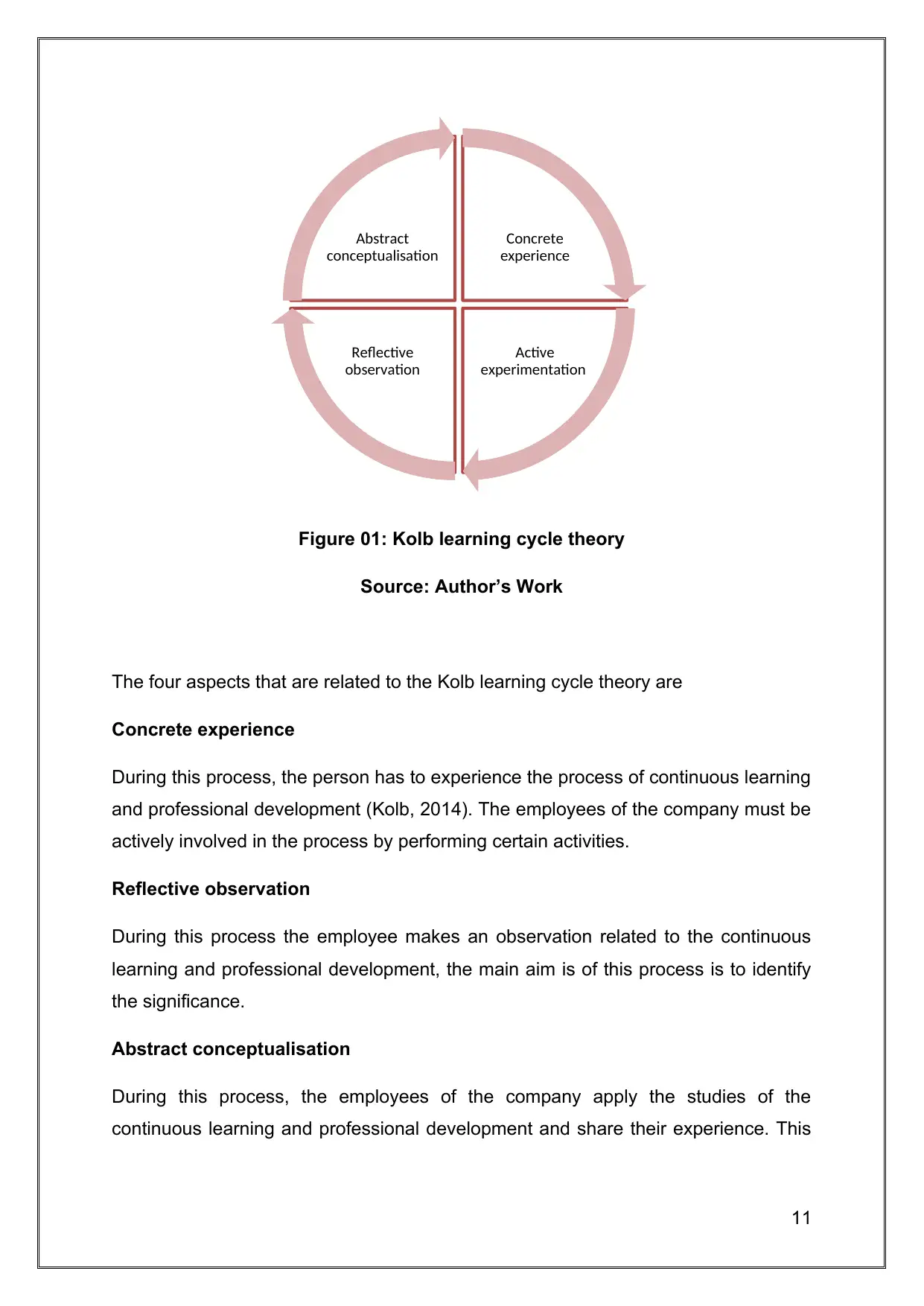
Figure 01: Kolb learning cycle theory
Source: Author’s Work
The four aspects that are related to the Kolb learning cycle theory are
Concrete experience
During this process, the person has to experience the process of continuous learning
and professional development (Kolb, 2014). The employees of the company must be
actively involved in the process by performing certain activities.
Reflective observation
During this process the employee makes an observation related to the continuous
learning and professional development, the main aim is of this process is to identify
the significance.
Abstract conceptualisation
During this process, the employees of the company apply the studies of the
continuous learning and professional development and share their experience. This
11
Concrete
experience
Active
experimentation
Reflective
observation
Abstract
conceptualisation
Source: Author’s Work
The four aspects that are related to the Kolb learning cycle theory are
Concrete experience
During this process, the person has to experience the process of continuous learning
and professional development (Kolb, 2014). The employees of the company must be
actively involved in the process by performing certain activities.
Reflective observation
During this process the employee makes an observation related to the continuous
learning and professional development, the main aim is of this process is to identify
the significance.
Abstract conceptualisation
During this process, the employees of the company apply the studies of the
continuous learning and professional development and share their experience. This
11
Concrete
experience
Active
experimentation
Reflective
observation
Abstract
conceptualisation
⊘ This is a preview!⊘
Do you want full access?
Subscribe today to unlock all pages.

Trusted by 1+ million students worldwide
1 out of 23
Related Documents
Your All-in-One AI-Powered Toolkit for Academic Success.
+13062052269
info@desklib.com
Available 24*7 on WhatsApp / Email
![[object Object]](/_next/static/media/star-bottom.7253800d.svg)
Unlock your academic potential
Copyright © 2020–2026 A2Z Services. All Rights Reserved. Developed and managed by ZUCOL.




